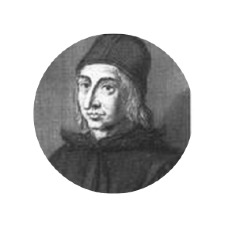Who was Rudolf Agricola?

'The most important thing is (…) to come up with something new and leave it for others, creativity, because otherwise we are no more than a book that holds things.' (Rudolf Agricola)
After whom is our institute named?
Rudolf Agricola (1443/4 -1485) was a Dutch humanist, philosopher, and philologist. He was one of the most important figures of the northern Renaissance and is considered one of the most significant people in the history of Groningen.
He is known for his innovative contributions to the study and teaching of the humanities (such as the study of classical languages) and for promoting it in the Netherlands. Coming from Groningen, he had scientific ambitions with international reach, just like our Agricola School.
Agricola was born in Baflo, a village in the province of Groningen. He studied classical languages and law in Erfurt, Leuven, Pavia, and Ferrara, and excelled in the humanities. He was an exceptionally gifted orator, a good singer, an excellent organist, and an enthusiastic boxer.
In 1479, Agricola returned to the city of Groningen, where he became secretary. In this role, he traveled extensively and established numerous national and international contacts. For example, during the winter of 1481/1482, he represented the city of Groningen at the court of the Burgundian Duke Maximilian I. In 1484, he accepted a prestigious position at the court of the Bishop of Worms. After a trip to Rome on behalf of the Count Palatine, he died in Heidelberg in 1485.
Inspirational figure for Erasmus
As a student in Deventer, Erasmus of Rotterdam personally met Agricola, an encounter Erasmus later described as one of the highlights of his life. He continued to admire Agricola throughout his life. It was also Agricola who inspired Erasmus to focus on studying the original languages of the Bible (Hebrew, Greek, and Latin), making Erasmus the most famous European scholar of his time.
Agricola's work had a significant impact on the study and teaching of the humanities in the Netherlands and beyond. He wrote several important texts on the subject, translated numerous Greek works into Latin (the international language of Europe at the time), was one of the few people north of the Alps who mastered ancient Greek, and promoted the study of ancient Greek and Latin culture as the foundation of civilization.
Agricolas magnum opus, De inventione dialectica (On Dialectical Invention, 1479), was first printed in 1515 and became very popular in the 16th century. This book broke with the medieval way of reasoning and is one of the first and most important theoretical contributions to the argumentation theory of the humanists. How can one reason meaningfully? How can one weigh pros and cons and assess arguments? How can one provide practical advice and valid judgments? These are questions that the Agricola School still asks today.
Academic Formation
In addition to his scientific contributions, Agricola also played an important role in the cultural and intellectual life of Groningen. He belonged to the Aduarder Circle, a group of humanistic scholars who met at the Aduard monastery near Groningen and established Groningen as a center of avant-garde science. As the Agricola School, we are also a circle of scholars working at the frontiers of knowledge: we organize meetings, symposia, webinars, research meet-ups, and more.
Due to his contributions to the culture, education, and science of his time, Rudolf Agricola was already considered one of the most important figures in the history of Groningen by the founders of the university. His name is still remembered in the province with various monuments, streets, and buildings named after him.
More on Rudolf Agricola:

| Last modified: | 20 June 2024 11.04 a.m. |

